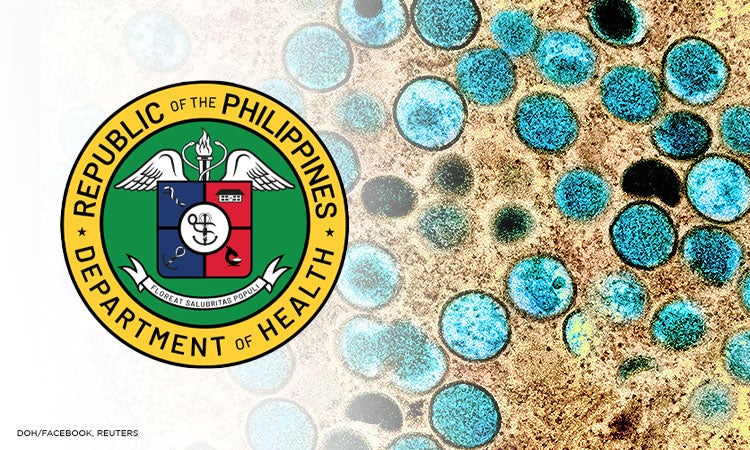To sum up:
+ Amid a global health emergency for mpox, the Philippines detected three active cases for 2024. The Department of Health says the recent infection is caused by the milder type of the virus.
+ Health officials say there is no available vaccine yet in the country to fight against mpox. But they also point out supportive care can be done to treat possible cases.
+ The DOH says border controls and quarantine facilities are not needed.
+ Health Secretary Ted Herbosa has ordered an increase in testing and reeducation of doctors to detect suspected cases.
+ Experts advise Filipinos to get reliable information on mpox.
Metro Manila, Philippines — The world is on guard for the current outbreak of mpox in Africa and global health authorities are doing everything not to let cases spill outside the continent.
READ: WHO declares mpox a global public health emergency for second time in two years
In the Philippines, the Department of Health said it detected three mpox cases in 2024, bringing the total count to 12.
Case 10 was announced on Aug. 19 — or five days after the declaration of a global health emergency for mpox. The Quezon City government identified 41 close contacts.
Cases 11 and 12 were announced on Aug. 26, but the DOH said it cannot determine yet any epidemiologic linkages of the two infections to case 10.
“That means ‘yong virus ay nandito na sa Pilipinas,” Health Secertary Ted Herbosa said in a news conference where he announced the first reported case this year. “We had nine cases noong 2023 pero pakonti-konti ‘yong nate-test, that means the mpox virus is among us.”
[Translation: That means the virus is already in the Philippines. We had nine cases in 2023 but only tested a few, which means the mpox virus is among us.]
But while some are concerned about another COVID-19-like situation, experts are appealing for calm as mpox is not the same as COVID-19, a respiratory disease. NewsWatch Plus gives you the information you need to understand mpox.
Determining clades is important
Mpox, formerly called monkeypox, is a viral infection that causes flu-like symptoms and a rash that looks like blisters or sores. These skin lesions would be filled with water before turning to pus. Mpox is usually mild but can be fatal.
The monkeypox virus can spread through close and intimate or sexual contact with the infected person, through contact with contaminated materials like clothing and bedding, or through infected wild animals.
The DOH said that once the scabs fall off and a new skin forms, the person may be considered not infectious anymore.
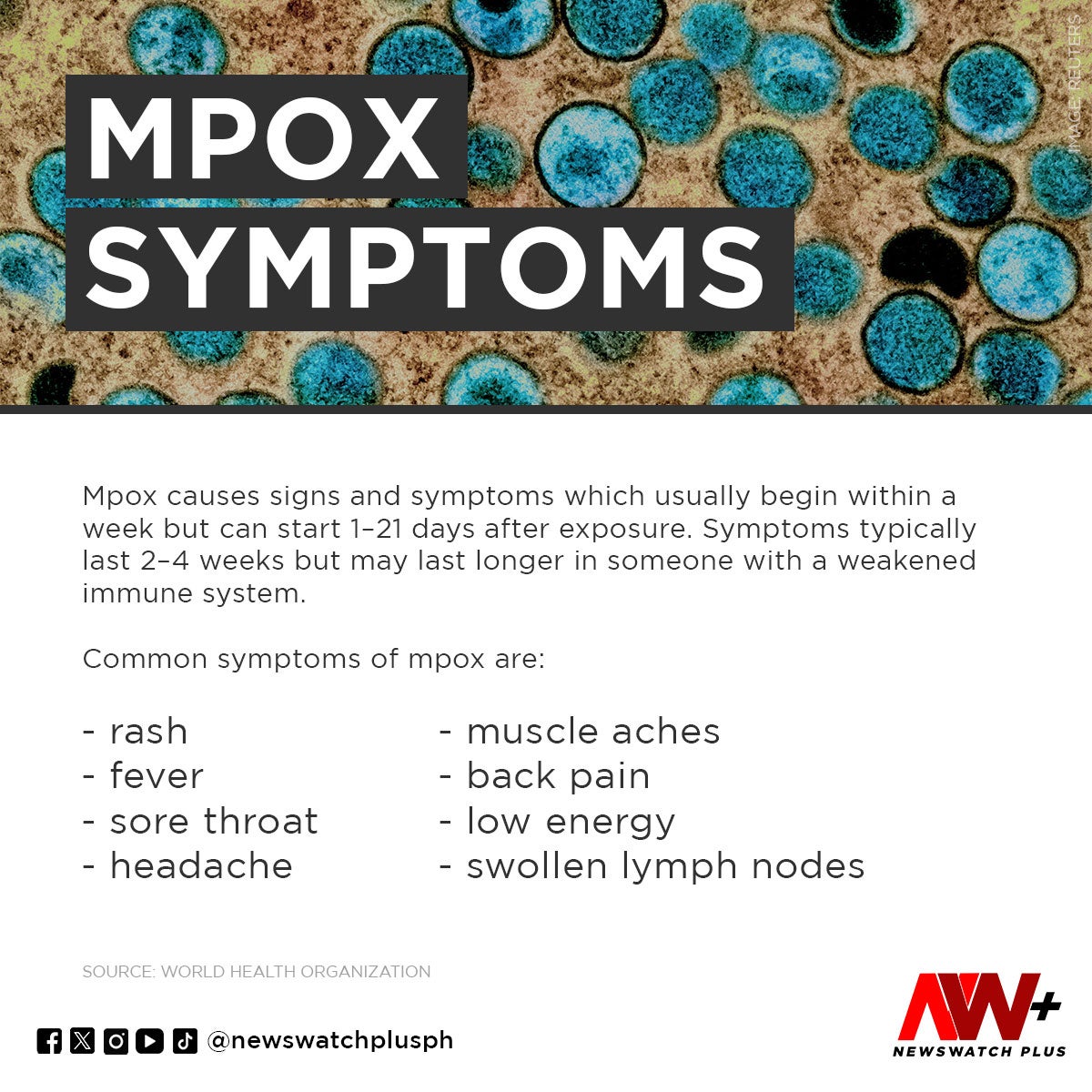
This is much different from COVID-19, which can also be transmitted airborne. “Kaya mas mahirap siyang ipasa compared sa COVID-19 [That’s why mpox is more difficult to transmit compared to COVID-19],” Dr. Karl Henson, a national board member of the Philippine Society for Microbiology and Infectious Diseases (PSMID), told NewsWatch Plus.
“Based just on how it's transmitted, ‘yung physiology ng [the physiology of the] virus, I do not expect na we're going to go into that level of restrictions again,” Henson said.
It was vital for authorities to know the type of mpox that caused the latest infection in the country.
“Because the current Mpox clade I (clade Ib) circulating in the African continent is associated with higher transmissibility and virulence,” Dr. Tony Leachon, an independent health reform advocate, told NewsWatch Plus. “That’s why enhancing our surveillance thru testing [and] genomic determination is important.”
The monkeypox virus has two genetic clades. The DOH said clade I, observed mainly in the Congo basin (Central Africa), is more likely to cause severe illness and death, especially in the immunocompromised. The WHO said more research is needed for the clade Ib offshoot, which is behind the current outbreak in Africa.
Clade II, seen mainly in West Africa, is the “milder” type that drove the 2022 global outbreak. This variant prompted the first declaration of WHO’s highest alarm for mpox. The nine mpox cases recorded in the Philippines were caused by clade II and have already recovered. The latest three were also found to be of clade II.
“We might need to expect higher cases if it’s clade Ib,” Henson said.
“Pero [But] you still need to get protected from both types of the virus…whether clade I or clade II,” the infectious disease expert said. “The way that you prevent people from getting it is the same.”
And the ultimate safeguard against mpox: proper handwashing. “Soap and water can kill the virus,” DOH chief Herbosa advised.
On vaccines and supportive care
According to the WHO, some vaccines for smallpox, an already eradicated disease, have been approved in various countries for use against mpox. Mpox vaccine manufacturers, meanwhile, are urged to scale up production.
The United States Centers for Disease Control and Prevention said the monkeypox virus is part of the same family as the virus that causes smallpox. But mpox is not related to chickenpox.
At the moment, there are no supplies of smallpox vaccines in the Philippines. Herbosa said that while the world is focused on giving available vaccines to Africa, the Philippines is in line to receive doses once the WHO shifts its strategy.
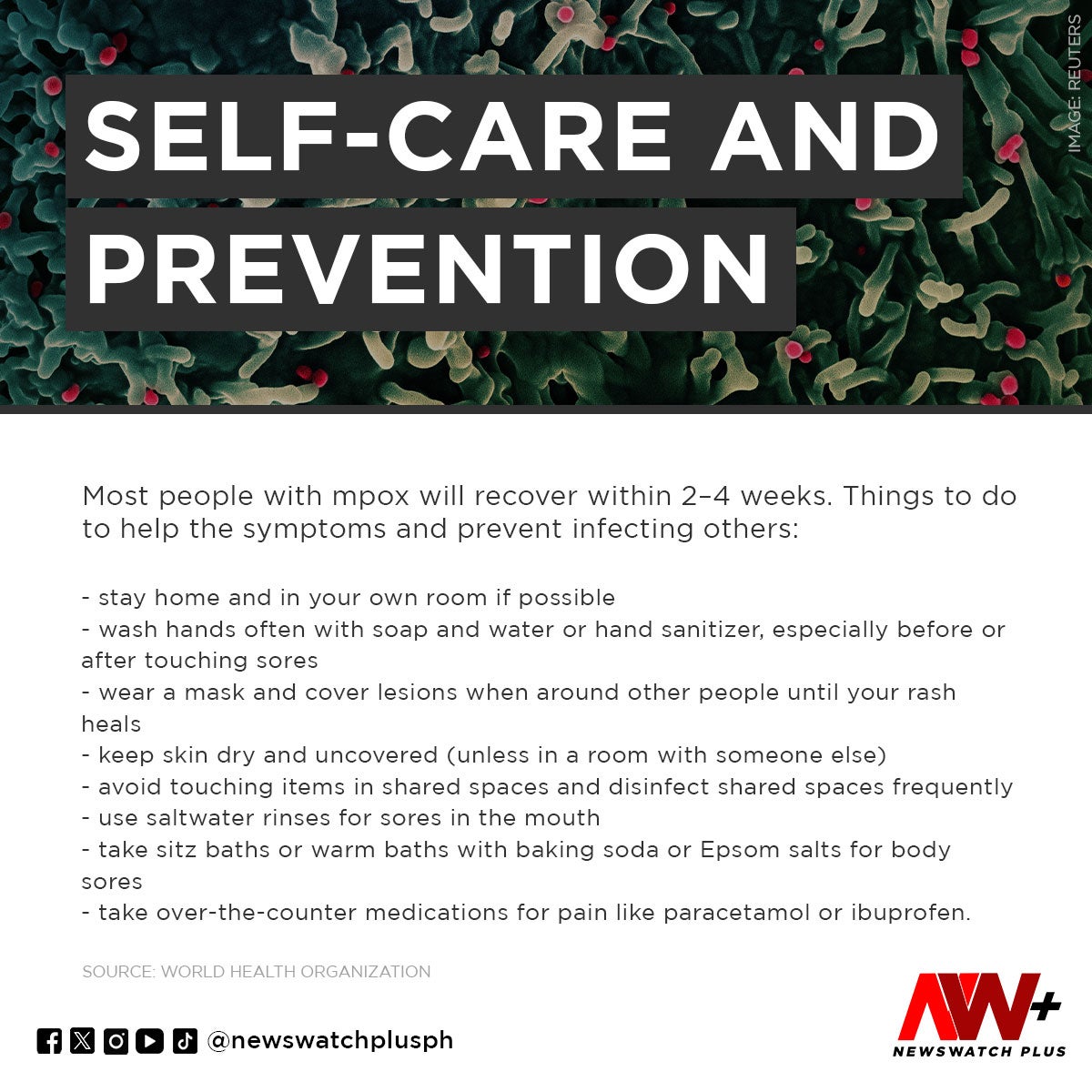
Meanwhile, the health secretary said supportive care is also the treatment for mpox. For example, paracetamol will be given to treat the patient’s fever, while lesions will also be taken care of. Anti-viral medication can be prescribed for those with comorbidities.
Herbosa said future cases might be recommended with home isolation that could take up to three weeks, or until the scabs dry up. Hospitalization will be an option if patients do not have an isolation area in home or they have comorbidities.
“Kung healthy ka magre-recover ka without any problem [If you’re healthy you will recover without any problem],” the secretary said.
Ramped up testing
The DOH previously assured the Bureau of Quarantine remains on alert for mpox, especially travelers from Africa.
Herbosa also dismissed worries of border controls, saying it’s “immaterial” as there is already community transmission for the illness. Quarantine facilities similar during the COVID-19 pandemic era are not needed, he added.
But with heightened surveillance for mpox comes expected increase in testing for the disease, done through examining skin lesion material by polymerase chain reaction (PCR).
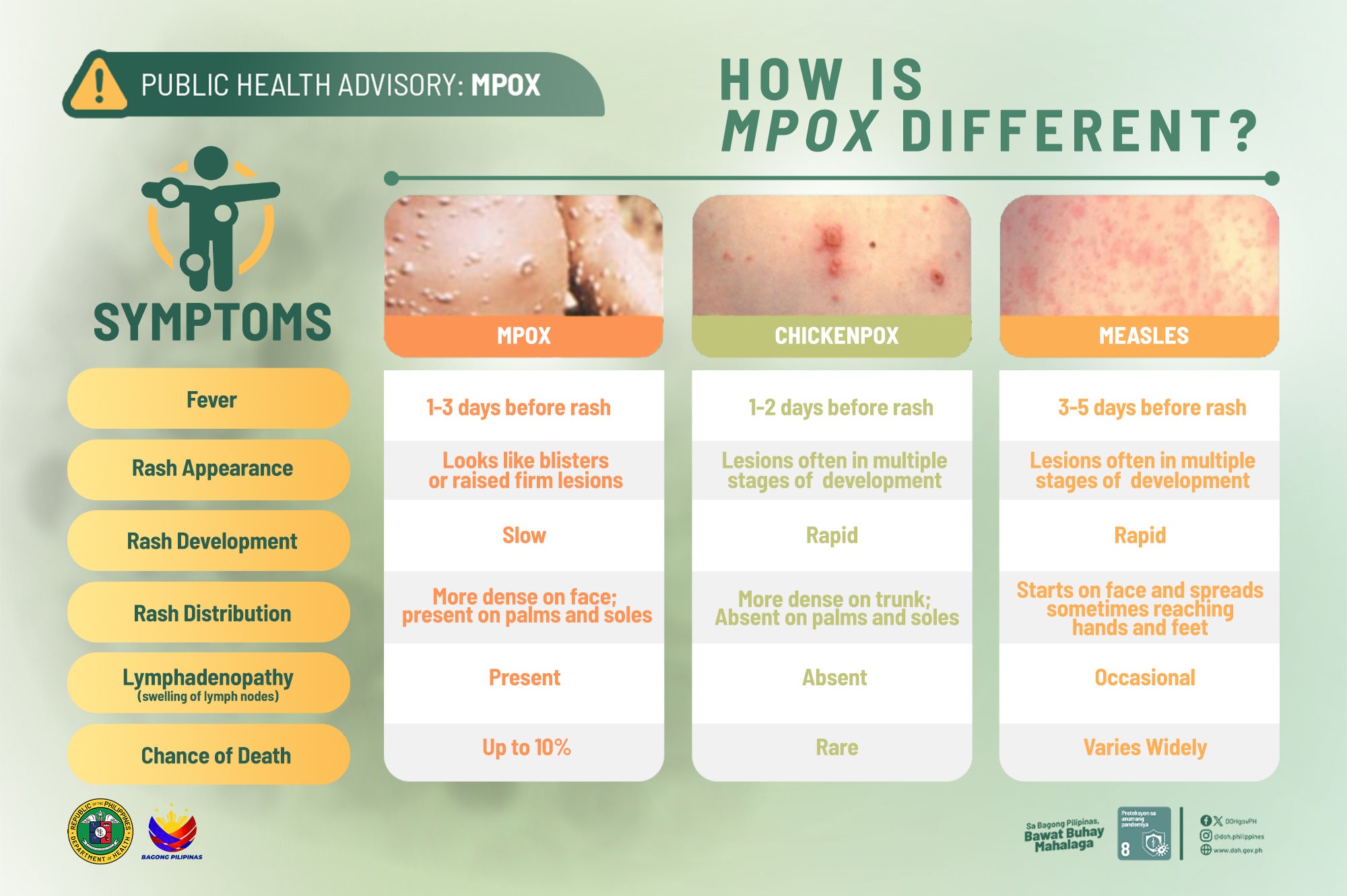
(From Department of Health)
Henson said part of the lessons from the COVID-19 pandemic was to capacitate big centers across the islands in running their own PCR tests.
The samples of suspected mpox cases are submitted to the Research Institute for Tropical Medicine (RITM). Dr. Edsel Salvaña, an infectious diseases expert, said there are mechanisms to send the tests from the hospitals to RITM.
“We can also scale up testing in other sites if there is a need since it is a PCR test and many places have that capability as long as they have the correct kits,” Salvaña told NewsWatch Plus.
During the news conference on Aug. 19, Secretary Herbosa said he ordered to scale up testing for mpox across the country and reeducation of doctors to detect suspected cases.
Arming ourselves with correct information
Health officials said they remain aware and alert for the mpox situation, telling the public not to be too alarmed.
The DOH said its collaboration with dermatologists will be important in the country’s response. The agency also said it is updating its guidelines for mpox.
“If they did risky behavior and then now they have lesions, then they should consult [a doctor],” Herbosa said. “And the government will be able to provide the testing and the treatment for them.”
“We are better prepared and people know how to protect themselves overall,” Salvaña told NewsWatch Plus. “I also like the fact that people aren’t panicking and are staying tuned for good quality information.”
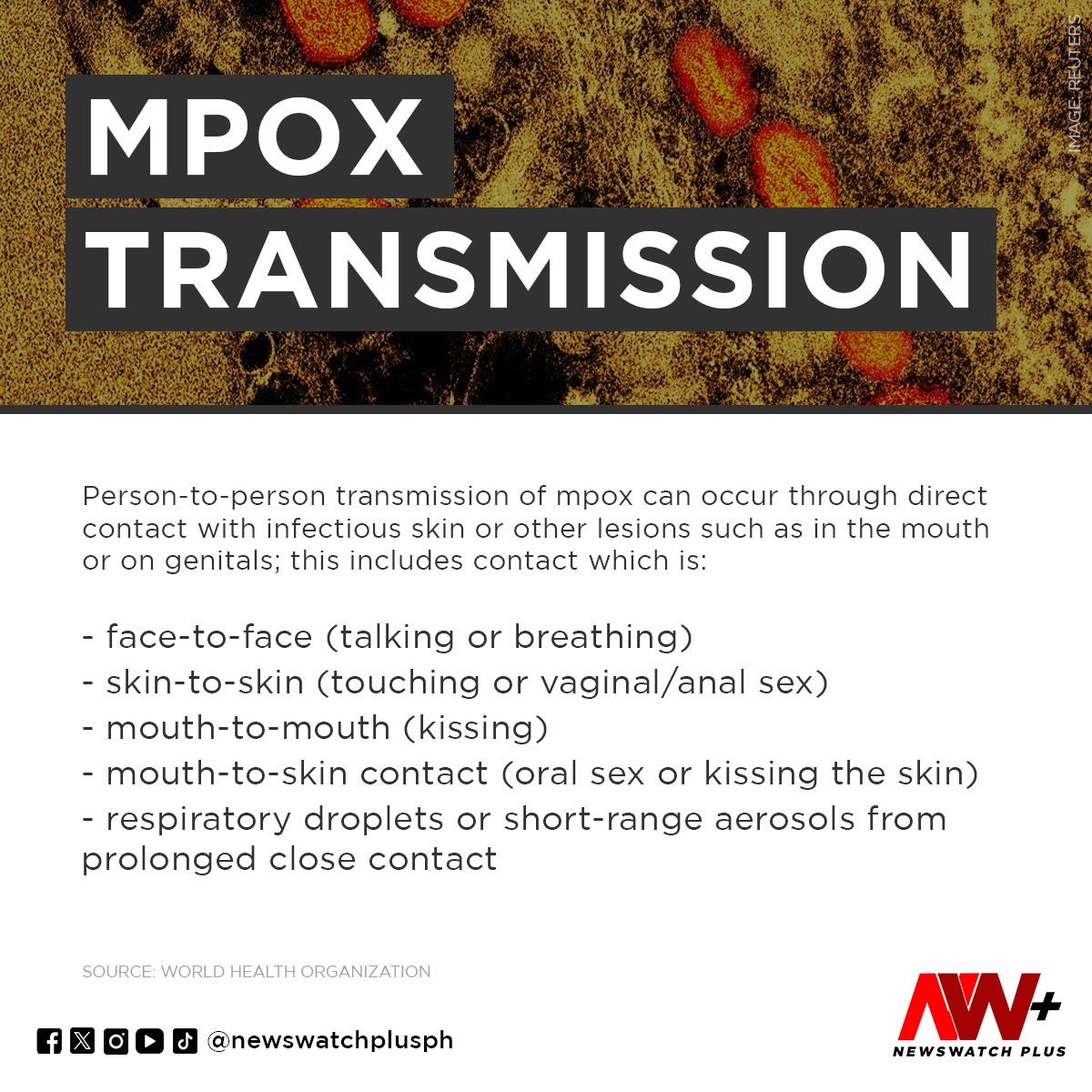
For Henson, he said he’s sure PSMID, other medical societies, and the DOH will work to provide information about mpox, “so that people are aware, so that people are armed with the correct information.”
“Babalik tayo dun sa [We go back to] avoiding crowded places, covering your skin if you're going out to a crowded place…wearing a mask if you're going to a crowded place, alcohol hand rubs and hand hygiene,” Henson told NewsWatch Plus. “So ‘yung mga gano’ng [Those] interventions I think will do a lot to make sure lang that the number of cases are minimized.”
Leachon also said preparation is most important and partnership of medical organizations with the WHO “will be crucial to combat fear and fake news.”
“Agile leadership and acting with sense of urgency by our government leaders are most crucial in times of crisis,” he told NewsWatch Plus.

